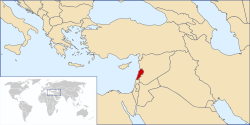Assassination In Lebanon: Syria’s Sideshow? – OpEd
By Arab News
By Abdel Aziz Aluwaisheg
THE assassination of Wissam Al-Hassan, a key Lebanese security official, on Friday in central Beirut may prove to be a major turning point in the Syrian conflict, as it metastasizes into other countries in the region. While it is inevitable that the attack would heighten tensions within Lebanon’s fragile political structure, let’s hope that Lebanese wisdom would deny the perpetrators’ their goals of creating chaos in Lebanon, reigniting its civil war, or abandoning efforts to investigate past crimes committed by Syria or its Lebanese allies.

While it is too early to determine the actual persons responsible for Friday’s car bomb, the assassination bore the marks of Syrian hits, carried out either directly by its own intelligence services or proxies in Lebanon. If that turns out to be the case, it is another sign that this regime is determined to take the conflict to neighboring countries and try to bring them down with it as it drowns in its own people’s blood.
By internationalizing the conflict, the Syrian regime may have accelerated outside intervention. As the conflict remained confined inside Syria, traditional international law tools made it difficult for the international community to intervene. In fact, Russia’s main argument for shielding Assad from international intervention is precisely that the conflict is an internal one and should be left to the Syrians to sort it out. By deliberately expanding the conflict zone, first into Turkey and now Lebanon, Syria is undermining the arguments of its main ally.
Gen. Wissam Al-Hassan had powerful enemies, chief among them were the Syrian government and its ally Hezbollah, both of which could be involved. Both have employed assassinations in the past against their opponents. They targeted political and religious leaders, academics, writers, journalists, and whoever challenged their attempts at supremacy over Lebanon.
In early August, Al-Hassan led Lebanon’s investigation of Michel Samaha, a pro-Syrian former Lebanese information minister and member of Parliament, who was caught smuggling explosives into Lebanon for use in terrorist acts designed to create maximum disruption of political reconciliation between Lebanon’s factions. Had he succeeded, Lebanon would have been dragged into the Syrian conflict, relapsed into civil war or both. Therefore, after Friday’s assassination, many Lebanese speculated that Syria wanted to kill Al-Hassan for his role in foiling Samaha’s scheme.
Before the Samaha affair, Al-Hassan led an investigation into Hezbollah’s role in the assassination of former Prime Minister Rafik Al-Hariri in 2005. The pro-Syrian, pro-Iranian party has denied involvement, but has undermined its own case by engaging in a sustained campaign of assassination and intimidation of its and Syria’s opponents in Lebanon.
Although Hezbollah is a major part of the ruling coalition in Lebanon and has a controlling minority in both the government and Parliament, in many ways it acts as a rogue group. On Thursday, the day before Al-Hassan’s assassination, the UN Secretary-General Ban Ki-moon released a report accusing the party of fighting in Syria on the regime’s side. The report warned that its activities in Syria “contradict and undermine the dissociation policy of the government of Lebanon, of which Hezbollah is a coalition member.” In an unusually blunt statement, the UN chief said, “(T)he increasing number of reports of activities in Syria by Hezbollah, a member of the governing coalition, could jeopardize this policy and ultimately Lebanon’s stability.”
Twenty years ago, when I started research for a series of articles and reports about Lebanon, I quickly found out how pervasive Syria’s meddling was in almost every part of that country’s political life. Its allies in Lebanon, including Hezbollah, stopped at nothing in enforcing Syria’s dominance in Lebanon.
Some Lebanese then told me that Lebanon’s problem was that it was too close to Syria and Israel. What Israel could not do through its high tech, devastating wars against Lebanon, Syria was able to accomplish through more rudimentary methods.
Israel then had a free hand over the skies, unfettered by international law or UN censure. Its pilots enjoyed lording it over the hapless Lebanese with their newly minted US-made airplanes and missiles, which wreak havoc everywhere. In addition, every now and then, Israel would invade Lebanon using ground and naval forces. It also sent assassination squads of its own to kill or kidnap at will key Palestinian and Lebanese figures. Syrian forces stationed in Lebanon rarely intervened. I was surprised to find out that those forces almost never fired a shot to challenge Israeli forays into Lebanon. Even when they were specifically targeted by Israeli planes, Syrian forces just turned the other cheek. I was puzzled but the reasons became clearer later on.
During my travels to Lebanon I often came across Syria’s ragtag army of poorly trained, dispirited foot soldiers, with old Soviet-era tanks and armored vehicles. It was hard to reconcile this image with the other image, conveyed to me by my Lebanese interlocutors, of an omnipotent force that was the final arbiter in Lebanese affairs.
But soon enough I found out that, for Syria’s purposes, it did not need high tech hardware. Its Soviet-era artillery and tanks were sufficient to shell and sow terror in civilian neighborhoods. The death squads it dispatched in Lebanon did not need sophisticated weapons. They favored blunt instruments, such as car bombs, which terrorized populations as they eliminated their assassination targets. You may remember that the car bomb that killed Hariri, on Feb. 14, 2005, had about 1,800 kilograms of explosives and managed to kill 22 and maim scores of his companions and bystanders.
Friday’s car bomb in Beirut was of a similar pedigree in terrorizing a peaceful neighborhood. The powerful explosion killed and injured scores of bystanders, in addition to its likely target, Gen. Wissam Al-Hassan.
